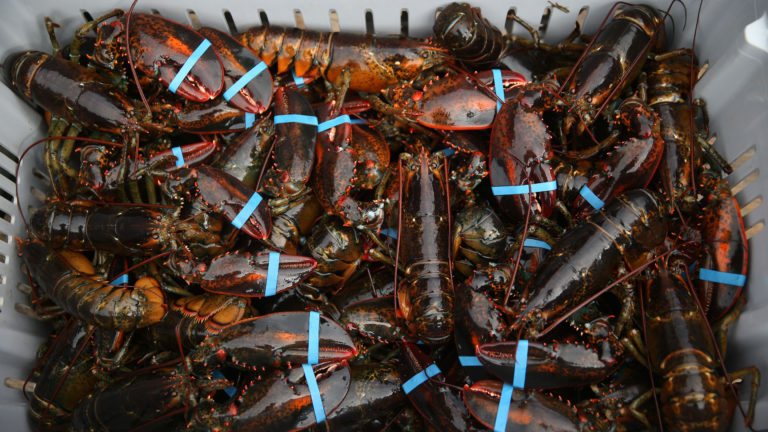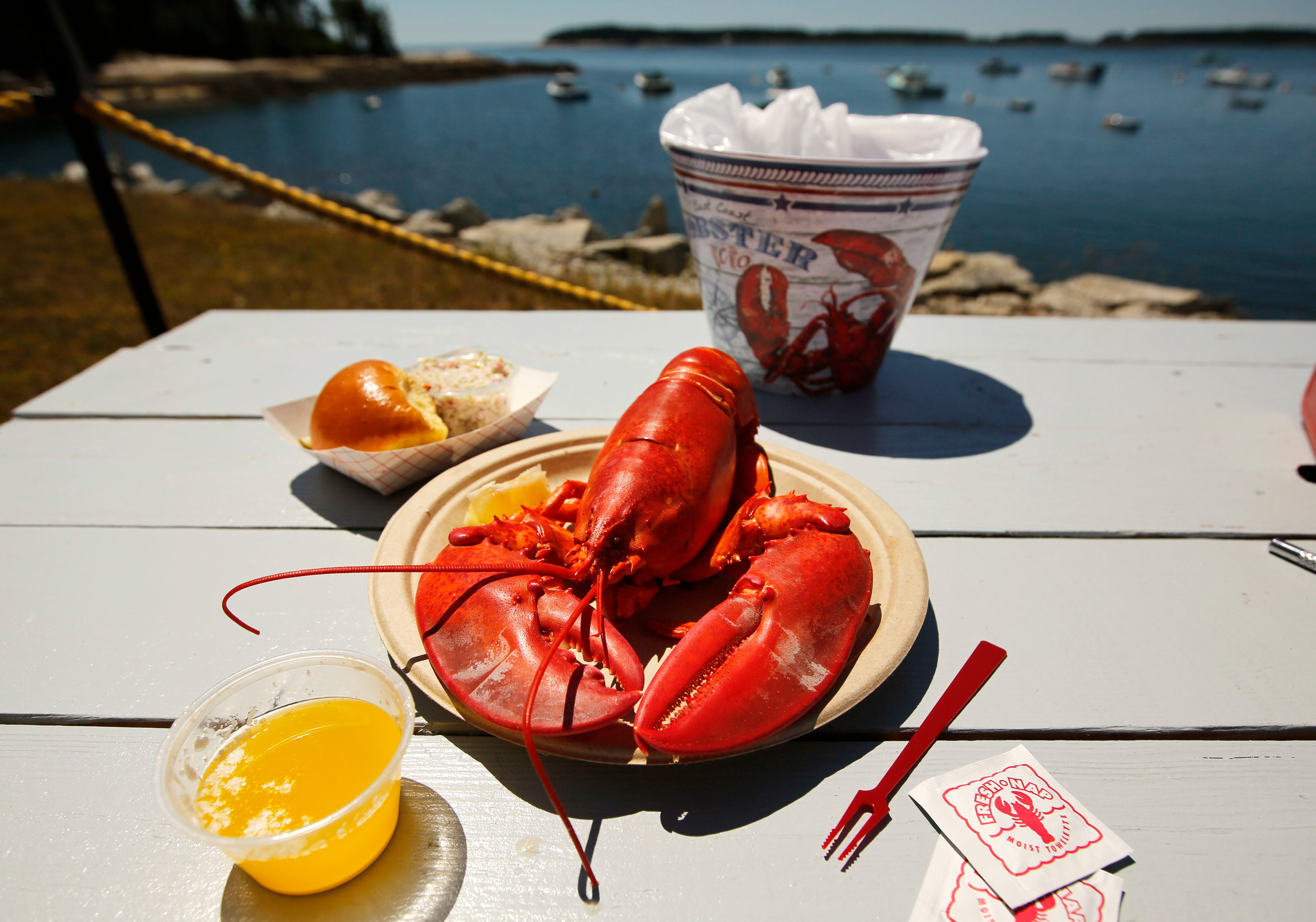Wickedpedia
Legend has it the crustacean was as soon as so plentiful — and held in such low esteem — that it was served as jail meals. However is that true?

New Englanders love lobster. It’s been part of the area’s culinary DNA for as many as 2,000 years, courting again to the indigenous Penobscot and Wabanaki peoples’ early lobster bakes.
Someday between then and now, the thickly carapaced backside dweller earned a popularity as probably the most refined shellfish. It doesn’t look scrumptious — it seems to be like a prehistoric underwater cockroach. However when cooked correctly, lobster meat tastes candy and tender and completely wealthy. Add some drawn butter to the equation? Yum.

Through the years, although, a number of historians and bloggers have claimed that the top-shelf crustacean was as soon as so plentiful — and held in such low esteem — as to be served solely to the poor, servants, and prisoners.
“Grime-cheap as a result of they have been so copious, lobsters have been routinely fed to prisoners, apprentices, slaves and youngsters throughout the colonial period and past,” one such account reads.
“Lobsters have been thought-about the ‘poor man’s rooster’ and primarily used for fertilizer or fed to prisoners and slaves,” one other declares.
Upon nearer inspection, these (referenceless) stories sound a bit far-fetched. Even for those who grant that lobster was once extra ample and cheaper, it’s nonetheless difficult and labor-intensive to arrange. Boston.com requested a couple of consultants for his or her tackle the native legend.
Sandy Oliver, a meals historian and author primarily based in Isleboro, Maine, shared our suspicions: “Who the hell goes to select all of the meat off the lobster to supply sufficient for a jail full of individuals?”
What did colonial prisoners eat?
Keith Stavely and Kathleen Fitzgerald have co-written a number of books and essays about American meals historical past, together with the 2015 title “America’s Founding Meals: The Story of New England Cooking” and “Northern Hospitality: Cooking by the Guide in New England.”
In the middle of their analysis for these volumes, the Rhode Island-based husband and spouse got here throughout the lobster-as-prison-food story however discovered no laborious proof within the historic report to assist it. In an e mail to Boston.com, they defined what they have been — and weren’t — capable of show.
New England prisoners might have been fed lobster each occasionally “in the event that they have been imprisoned close to the coast the place lobsters have been plentiful,” Stavely and Fitzgerald allowed, as a result of “lobsters have been a valued however not a luxurious meals till the twentieth century. However lobster was by no means the prisoners’ regular weight-reduction plan.”
The historians discovered that throughout the seventeenth century, after the primary European colonists arrived in New England, most prisoners have been fed easy, cheap meals: salt pork, baked beans, salt cod, brown bread, and perhaps hardtack (a dense cracker with an extended shelf life).
“These have been a budget, calorie-dense, simply preserved and simply ready meals of the area,” Stavely and Fitzgerald wrote. “Cabbage was the most typical vegetable, and potatoes would have been served by the Nineteenth century.”
Lobster, then again, was “difficult to move (in the event that they died en route they have been no good for human consumption), cumbersome to arrange, requiring massive kettles (that’s why many city buyers introduced them house already cooked), after which there could be the issue of disposal of large quantities of shells.”
Oliver, the historian from Maine, did her personal digging and located no contemporaneous references to New England prisoners consuming lobster throughout the seventeenth or 18th centuries. And when the story did materialize on the town histories in a while, it wasn’t even initially about lobster.
“The punchline … is that the story was by no means advised about lobster till the twentieth century,” she defined. “The story was advised with virtually the identical language, identical personnel, identical geography, identical every little thing about salmon within the 1800s. And it wasn’t true about salmon both!”
Was lobster all the time so widespread?
In 1623, throughout a interval of meals shortage in Plymouth Colony (in present-day Plymouth, Massachusetts), the colonial governor William Bradford wrote an oft-cited letter complaining that the “finest dish” the settlers might put together was “a lobster or a chunk of fish with out bread [or] anything however a cup of honest spring water.”
Historians took this element and ran with it, claiming lobster was thought-about a poor man’s meals at the moment. However Stavely and Fitzgerald argue that “Bradford’s remark has overshadowed the true analysis of lobster within the early days.”
Different accounts supply a extra balanced view: “Edward Winslow, one other observer writing from Plymouth Colony again to England in 1621 … bragged that ‘our Bay is stuffed with Lobsters all of the Summer season.’” Stavely and Fitzgerald wrote. “And some years later in Salem, Massachusetts, Francis Higginson boasted that ‘the least Boy within the Plantation might each catch and eat what he’ll’ of lobsters.”
Higginson did say he “was quickly cloyed with them,” however solely as a result of “they have been so nice, and fats, and luscious.”
From the 18th century onward, lobster’s social caché solely grew. Lobster meat started displaying up in stews, in sauces, and to boost the flavour of fish dishes. Potted lobster and lobster pie appeared in Nineteenth-century recipe books.
“The buyer demand for lobster was positively on the rise within the Nineteenth century, making lobster worthwhile on the market,” Stavely and Fitzgerald wrote. By then, lobster may very well be shipped from Maine to Boston, New York, and different East Coast industrial facilities. It arrived alive and may very well be bought and cooked contemporary. “Whereas this shellfish was nonetheless comparatively cheap … it was definitely not disdained as poor man’s meals,” they wrote.
Quick ahead to the current day. Centuries of lobster hype have depleted the populations alongside New England’s coast. Local weather change has compounded the issue, driving the remaining populations north in quest of cooler temperatures. However lobster, whether or not boiled, baked, or served up on a roll, stays a regional staple with its very personal mythology.
The tales we inform about our meals, Oliver believes, reveal extra about us than the meals.
“The underside line is when one thing like salmon or lobster begins to develop into slightly extra scarce, tales come up about how, , ‘Folks in these days have been so dumb, they didn’t know what an exquisite factor salmon was, they didn’t know what an exquisite factor lobster was!’” Oliver laughed. “It’s a approach for the people who find themselves telling the story to really feel higher about themselves, to really feel smarter and extra educated.”
E-newsletter Signup
Keep updated on all the newest information from Boston.com